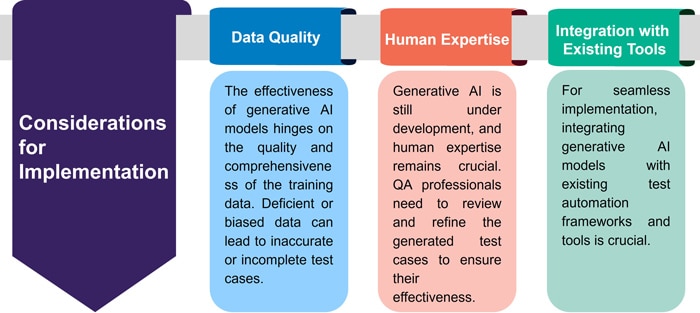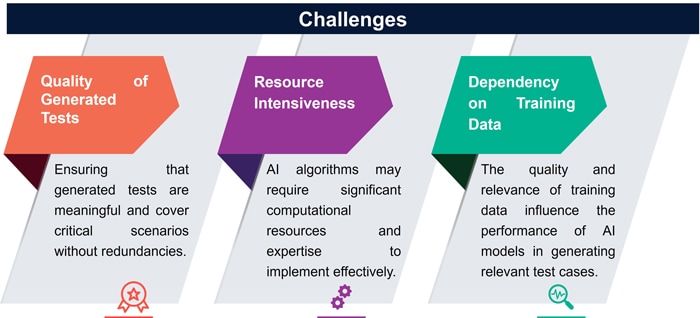Artificial Intelligence
Generative AI for Test Automation: Revolutionizing Software Quality Assurance
The software development landscape thrives on continuous innovation, demanding efficient and robust testing practices. Traditional testing methods, while valuable, often struggle to keep pace with evolving functionalities and user demands. Generative AI, the branch of artificial intelligence that focuses on the generation of new content/data, has emerged as a major change in this field. This white paper explores the transformative potential of generative AI for test automation, delving into its functionalities, benefits, challenges, future prospects, and considerations for implementation. It examines how AI-driven test automation can streamline processes, improve test coverage, and enhance the overall quality of software development.
Insights
- Current Landscape of Test Automation
- Generative AI in Action
- Benefits of Generative AI for Test Automation
- Considerations for Implementations
- Challenges
- Future Directions and Innovations
Introduction
Software Quality Assurance (QA) plays a critical role in ensuring the reliability, performance, and security of applications. Manual testing, though thorough, can be time-consuming, resource-intensive, and susceptible to human error. Scripted automation provides relief, but maintaining scripts can be cumbersome, and they often struggle to adapt to dynamic functionalities.
Generative AI presents a paradigm shift in test automation. Generative AI models may automatically generate comprehensive test cases using Natural Language Processing (NLP) and Machine Learning (ML) considerably enhancing the testing process. This white paper dives deep into how generative AI empowers QA teams to achieve unprecedented efficiency and effectiveness.
Current Landscape of Test Automation
Traditional test automation involves predefined test cases and scripts that require frequent updates to adapt to changing software functionalities. While effective, it can be time-consuming and may not cover all scenarios comprehensively. Generative AI introduces a change in basic assumptions by autonomously generating test cases based on various inputs and conditions, thereby enhancing coverage, and reducing manual effort.
Generative AI in Action
Unlike traditional scripted automation, Generative AI does not rely on pre-defined scripts. Instead, it learns from existing data and user behavior patterns. This data can include:
- Functional specifications
- User interaction data
- Code repositories
- Existing test cases
Through Deep Learning algorithms, generative AI analyses these diverse sources to understand the application's functionalities and user behavior. It then utilizes this knowledge to create a wider range of test scenarios compared to traditional methods.
Benefits of Generative AI for Test Automation
Generative AI offers several compelling advantages for test automation:
Improved Test Coverage
By generating diverse test cases that cover a broader spectrum of scenarios, Generative AI significantly increases the overall test coverage. This leads to a higher probability of uncovering test cases and potential defects.
Reduced Manual Effort
Automating test case generation frees up valuable time and resources for QA professionals. They can shift their focus toward more strategic tasks like analyzing test results, designing complex test scenarios, and collaborating with developers.
Enhanced Efficiency
Generative AI models can learn and adapt quickly, making them efficient in generating test cases that stay relevant throughout the development lifecycle.
Data-Driven Testing
Generative AI excels at creating test data that mimics real-world user behavior. This data-driven approach ensures that tests are more realistic and representative of actual use cases.
Improved Test Maintainability
Generative AI can automatically update test cases as the application evolves, reducing the maintenance burden associated with traditional scripted automation.
Improved Accuracy and Reliability
Generative AI-driven automation reduces human error and ensures consistent test execution, leading to more reliable testing outcomes.
Adaptability to Changes
Generative AI models can dynamically adjust test cases in response to changes in software requirements or functionality, maintaining test effectiveness across iterative development cycles.
Considerations for Implementation
While generative AI brings immense value to test automation, there are a few aspects to consider:

Challenges
Despite its potential, integrating generative AI into test automation poses several challenges:

Future Directions and Innovations
The future of generative AI in test automation is promising, with ongoing research focusing on:

The future of software testing is undoubtedly interwoven with the advancements in generative AI. By harnessing this powerful technology, organizations can ensure the quality and reliability of their software while achieving significant gains in efficiency and cost-effectiveness.
Conclusion
Generative AI marks a significant leap forward in the field of test automation. Its ability to learn, adapt, and generate comprehensive test cases empowers QA teams to achieve unprecedented levels of efficiency and effectiveness. As the technology matures, its impact on software quality assurance is expected to be transformative. By embracing generative AI, organizations can build robust, high-quality software that meets the demands of an ever-evolving market.

Subscribe
To keep yourself updated on the latest technology and industry trends subscribe to the Infosys Knowledge Institute's publications
Count me in!









